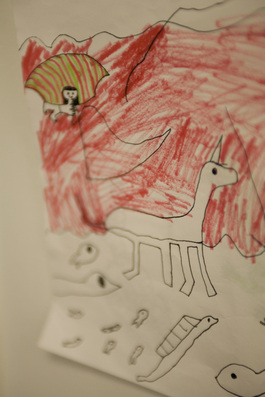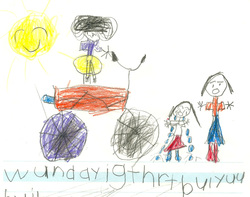Storytelling and Bookmaking Activities

By Sunny Im-Wang, Psy.D., S.S.P.
Storytelling and bookmaking activities aid in the development of essential skills such as planning, organization of thoughts, and verbal expression—skills necessary in order to express one’s needs. Storytelling and bookmaking are activities that fall under the umbrella of an important set of skills called executive function (EF). EF skills broadly include higher-order cognitive functions such as problem solving, behavioral inhibition, emotional control, organization of thoughts, ability to initiate projects or an activity, cognitive flexibility, working memory, sequencing, and planning. These are essential skills that will empower children and will serve them well as they grow to adolescence and adulthood. One of hallmarks of EF skills is behavioral regulation—the ability to maintain appropriate control of behavioral and emotional responses (for example, inhibition of thoughts and impulses, modulating affect/emotional response, and self-monitoring). EF also includes the ability to systematically solve problems via planning and organization as well as the ability to sustain task-completing efforts. Executive functioning is a set of abilities and skills that can be best taught by hands-on experience. Consequently, an activity such as storytelling is a great way to teach planning, organization of both thoughts and materials, and the ability to see from others’ point of view (due to character building in the story). These EF skills are not part of a new or “up and coming” teaching methodology. They are, however, newly realized by many child educators, child psychologists, and researchers to have a significant impact on children’s fundamental abilities to pay attention, manage emotions, verbally express needs, and be in charge of their behavior. With better thought-out plans and self control, the benefits of developing EF skills in children are huge. These benefits multiply during the teen years, as teen brains tend to be more impulsive; it has been found that during these years, the emotional part of a teen’s brain is the first to react in decision making. To have already developed EF skills, such as thinking ahead and being able to calm or manage emotional reactions, is useful during adolescence and beyond. In addition, having mastery in EF skills is FUN! It facilitates your child learning, experiencing, and absorbing what is being taught to him or her. Although the activity of bookmaking may appear to be a simple process, it involves a range of cognitive skills and the orchestration of those skills. Bookmaking is a great opportunity for children to learn executive functioning skills such as planning ahead, organizing their thoughts, expressing themselves verbally, and working memory. Cognitive Skills that are involved in storytelling & book making activity:
Emotional Gain
Important Points to Consider
Instructions for a Storytelling and Bookmaking Activity 1. What kind of story?
2. Try out some stories. You can also use a short story you both know in order to explore the following:
3. Ask how their story will go by revisiting the above questions. Be prepared to be amazed by your child’s imagination! 4. Count together the pages that will be used for the story. 5. Discuss and decide which scene will go on the each page. 6. Draw the scene for each page. 7. Create the cover—the image, the book title, and the author’s and illustrator’s names. Presto, you have a book! Helpful Note √ You can modify the level of difficulty to meet where your child is developmentally. Younger children may become sidetracked making designs with stencils. We recommend stencil use as a project of its own a day or two before beginning the actual bookmaking project. The importance should be placed on the process, not the finished product. √ You can break the bookmaking/storytelling activity into phases—it does not need to be done in one sitting, especially with younger children. Modify the steps so they are simpler and age appropriate. For permission to reprint this article, please click here. © 2010 Sunny Im-Wang, Psy.D. All rights reserved. |
Here are more articles you might want to readPicture Journaling for Young Children

Executive Function: Problem Solving Skills and Other Complex Thinking Skills in Children

Air Travel with Young Children: Airport, Airplane, and the Air Pressure?

Understanding Your Child’s Sleep
Tips for Managing Parenting Anxiety
The Importance of Self Care for Parents

|
Copyright © 2011-2024: Sunny Im-Wang, Psy.D., S.S.P. All Rights Reserved.
DISCLAIMER: The information on this site is for general information only. This information should not be construed to be either formal psychological or medical advice or the formation of a professional relationship with the authors of any of this information.
Persons accessing this site are encouraged to seek independent professional advice regarding their individual issues.
DISCLAIMER: The information on this site is for general information only. This information should not be construed to be either formal psychological or medical advice or the formation of a professional relationship with the authors of any of this information.
Persons accessing this site are encouraged to seek independent professional advice regarding their individual issues.